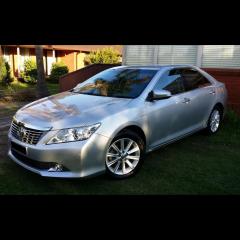-
Latest Postings
-
0
G’day from NSW
G’day All just got a 2012 (old shape) Corolla Ascent Hatchback Auto. Needs a few things done, it was my Dads who just passed away. Going to install pioneer head unit (basic one really) as a start, then maybe upgrade speakers but I’ll see how the oem ones go, I’ve read I’ll need at least 50w ones for the pioneer. Front inner plastic guards are a bit trashed along with bumper bar, just need to neaten it up a little. cheers Sparky -
3
Head Unit Replacement for 2010 Toyota Corolla Hatch
G’day TGA, hope you got this sorted, just about any 2 din would fit. I’m putting a pioneer one in but I’d like to know how to pull the trims apart to fit it 🤨 Every video shows the sedan with a different gearshift with short trims to remove but those 2 lower side ones are 1 piece on the hatch and I’m struggling. Do I need to remove console box to start removing those side piece. Any help cheers Sparky -
0
Landcruiser 200 GPS
I am sure many owners of Landcruiser 200s have had the same experience as me where the GPS has led me into the wrong roads. I’ve had two Landcruisers, a 2013 model and currently have a 2021 model. Both vehicles had/have poor GPSs. Even Toyota personnel agree with this. so I am considering replacing it with an after market unit. I don’t want one which relies on mobile phone connection. I am looking at a unit sold by Brummstadt. The link is https://www.brummstadt.com.au/products/toyota-land-cruiser-200-series-2016-2022-premium-head-unit-upgrade-kit-radio-infotainment-system-with-wired-wireless-apple-carplay-and-android-auto-compatibility I would appreciate any feedback from any owner who has taken this step. thanks, Bob See https://www.brummstadt.com.au/products/toyota-land-cruiser-200-series-2016-2022-premium-head-unit-upgrade-kit-radio-infotainment-system-with-wired-wireless-apple-carplay-and-android-auto-compatibility -
4
2010 AURION PRESARA - RELACEMENT OF FAULTY AUDIO SYSTEM.
Where can you buy this from and how much? -
1
Aurion "wobble"
Since last year I've been getting quite terrible wheel wobble between 60-70 mph on the expressway. Sort of notice it however way less evident now and again going more slow. Recently got crankshaft belt and flash fittings changed at a repairman I believe that accomplishes great work. This began occurring after I got excessively blissful doing doughnuts in the colder time of year and knock a snow bank tapping a road sign haha... I figured I twisted something in the driver side suspension...lower control arm, tie bar, and so on yet repairman said everything was straight and tight, bushings alright, no spillage on them or swaggers. He said perhaps a wheel arrangement would fix it. I maintain that should do swaggers in any case cause the ride isn't quite as smooth as it used to be. Contemplations? Assuming I get an arrangement would it be advisable for me to do the swaggers first or is that all the more with supplanting the lower control arm? -
54
Oil Pipe Leak
I'd be surprised if they expect you to pay for it as it is a recall issue. Glad it's been checked out before it's too late though. -
0
Fusible link has blown out twice
Any one had any experience with fusible links blowing out. Auto electrician replaced one fusible link today bc and after driving it for 1/2 hour the plastic has melted and the link red hot. It is the blue link in the set. Any suggestion? -
0
Hilux 2008 4x4- manual jumping out of 1st gear
Hi just wondering if anyone would know why my gearbox is jumping out of 1st gear, it engages into first but before I can change to 2nd gear it sometimes jumps back to neutral. -
54
Oil Pipe Leak
I just had my Aurion ATX 2010 in for service today and received a call regarding oil cooling pipe has a prick hole and car is deemed not safe to drive till replaced. Service department bloke said they are taking photos and sending of for Warranty and awaiting a reply if it will be replaced at their cost or mine. I was informed it was picked up during service in 2020 and deemed safe? I will keep you updated on the outcome. my car has always been serviced at Toyota and only has 209,900 Kim’s -
0
Thinking to get Yaris, what to look out for?
I am thinking of getting Yaris but unsure what to look out for ie what’s generally fails in Yaris etc. What mode is a better build etc. I have zero car knowledge so any advice is greatly appreciated. thank you kindly
-



Recommended Posts
Join the conversation
You can post now and register later. If you have an account, sign in now to post with your account.